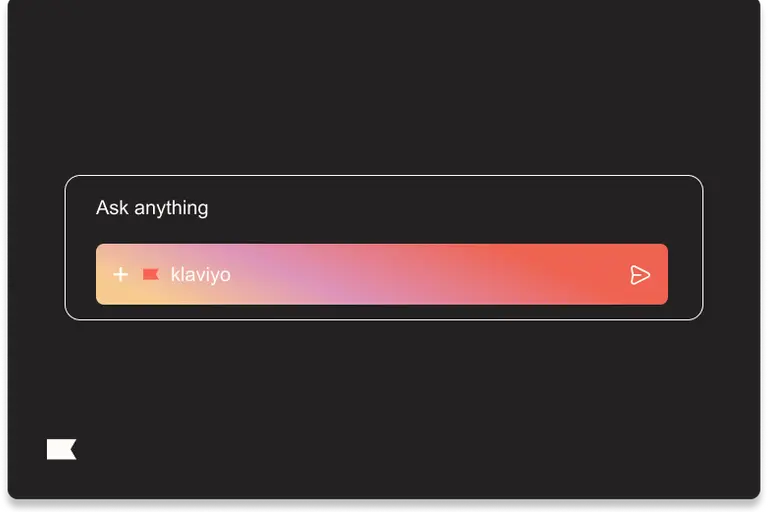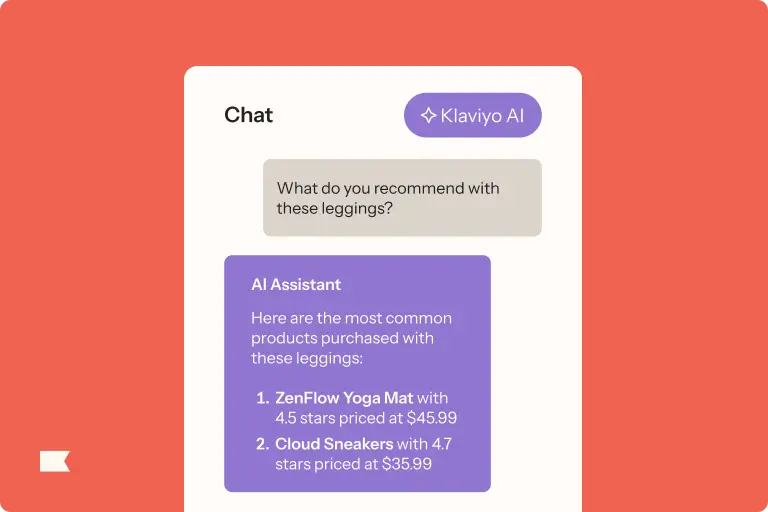In the world of pop-up forms, timing is everything.
Display your form too soon, and your visitors might click away before they even have a chance to decide if they’re interested.
Wait too long, and your visitors might leave altogether before seeing it.
Ecommerce brands optimize their forms because even small tweaks to display and behavior targeting can mean the difference between being invited to continuously market your products to someone for years to come and losing them forever.
So when exactly should you time your forms?
Instead of guessing or trying to figure out what everyone else is doing, use your own data to find the ideal timing for your audience. You can easily run A/B tests—or, better yet, use AI to save time and deliver even more accurate results.
We surveyed more than 1,500 marketing pros and found that 44% of marketers want AI to help them display website forms at the optimal time for conversion. That’s not surprising when you consider how effective AI can be at processing data and automating tasks.
Fortunately for all those marketers (and you), the wait is over. You can now use AI to optimize your form display timing,get more accurate results from your A/B tests, and more.
Stop guessing, and put your data in the driver’s seat. Here’s how.
Tip 1: Use Klaviyo AI to find the best display time for your forms
In Klaviyo, you can use AI to run an optimization test—a series of experiments to optimize a sign-up form’s display settings.
In this test, Klaviyo AI generates different variations of display timing and runs the test until a winner is chosen. These tests run in phases, so you always have the best variations running in competition until the top-performing form is identified.
The optimization process will continue running until AI finds the highest-converting display time. Then, Klaviyo will automatically set the winning form live. It’s that easy—one test to find the best display time for your forms.
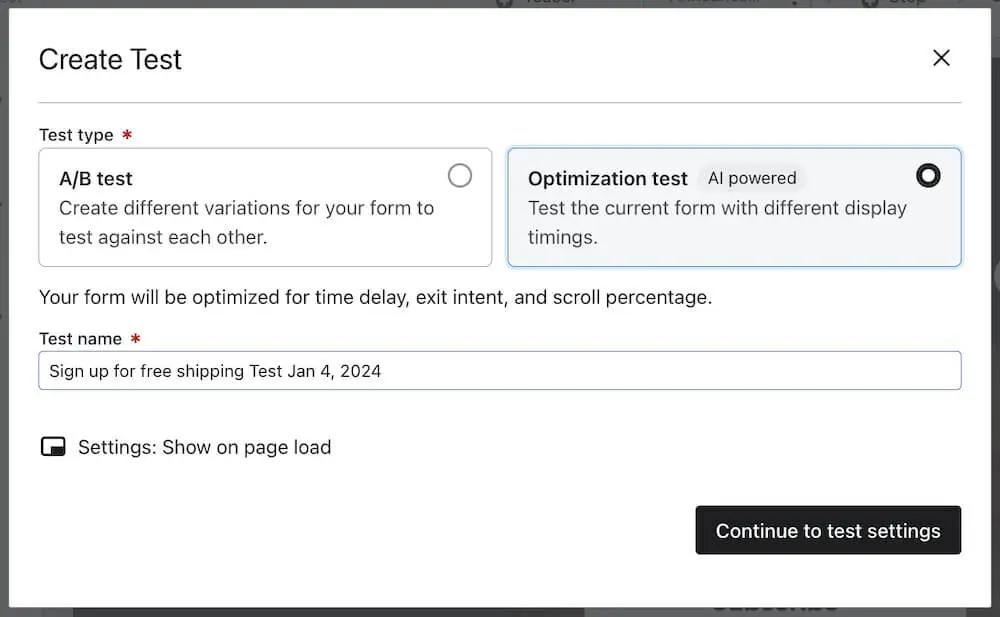
In February 2024, natural skincare brand Tata Harper started using Klaviyo AI to test and optimize their email and SMS sign-up forms. They tested 20 variations on placement and timing across their desktop and mobile sign-up pop-ups, all AI-generated based on their brand’s performance data. (Before, the team only manually tested 2 variations at a time.)
In the 30 days after the winning versions went live, submissions for both forms jumped 65%+ from the 30 days prior to testing.
“Our AI testing experience definitely made me excited to play with the other new Klaviyo AI features, because it was so hands-off and delivered immediate results,” says Alexandra Barlowe, the brand’s DTC email and SMS marketing director.
Tip 2: Run your own A/B tests for display timing
To get statistically significant results, you need a lot of traffic. For that reason, you need to have at least 400,000 contacts to access AI-generated optimization tests in Klaviyo (we use your total stored profile count as a proxy for website traffic).
Not quite there yet? You can still optimize form display timing using A/B testing in Klaviyo. The difference is you’ll manually set up the test and create the different variations to test against each other.
Tip 3: Run your own A/B tests for everything else
Smart A/B testing isn’t just helpful for optimizing display timing. You can also use A/B tests to optimize your form content with the help of AI.
When you A/B test a form, you can have Klaviyo AI select the winner as soon as you reach statistical significance and automatically deliver the winning content variation to the remainder of your audience. That means your best variation will be shown to the largest possible audience, which is a win for your overall conversion rates.
Try A/B testing these form elements:
- Form type (pop-up, fly-out, full page, or embed)
- Copy length or tone
- Image vs. no image
- Colors or branding
- Form layout
- Teaser vs. no teaser
- Discount vs. no discount
- Discount amount
- Page the form appears on
Important note: When A/B testing, always test only one variable at a time. When you test more than one variable at a time, you won’t know which one is responsible for the increase or decrease in performance.
Tip 4: Dive in to your sign-up form analytics
If you’re already familiar with email or SMS analytics, you probably know how valuable it is to test, iterate, and learn along the way.
The same goes for your sign-up forms. Your sign-up forms are what feed your list, and your list is what feeds your entire funnel, after all.
The beauty of optimization testing is that everything is automated so you can set it and forget it—and your results will be even more accurate than if you had spent hours reviewing your analytics.
But if you’re like us and you want to get the most out of your audience data, you can monitor your optimization tests in real time or review the analytics at the end. This gives you a deeper understanding of what’s working and what’s not so you can adapt your overall strategy.
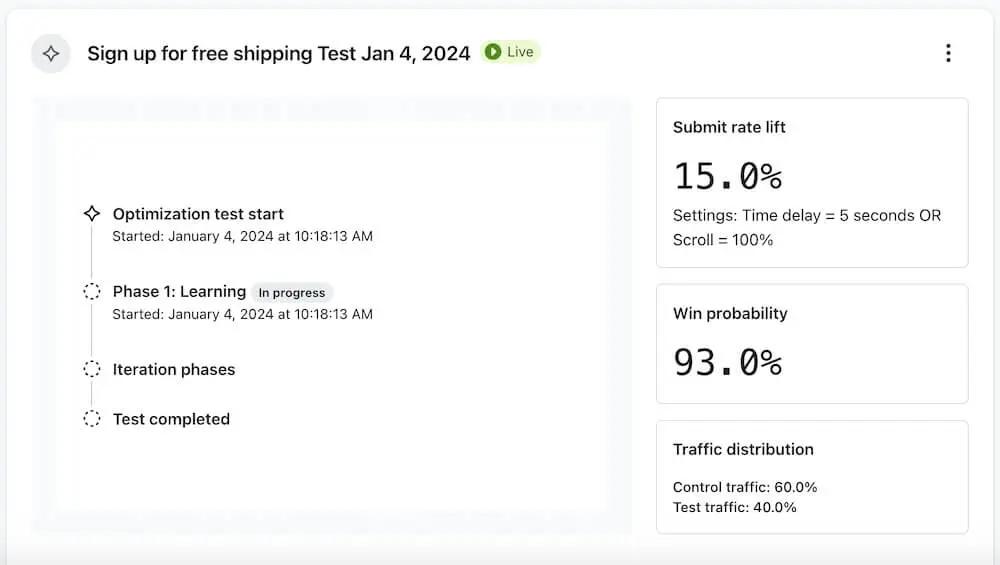
Beyond display timing, your sign-up form analytics provide a wealth of information you can use to improve your form performance.
One of the key success factors for data-driven marketers is reaching statistical significance. This is a fairly time-consuming task if you’re running your tests manually, but with Klaviyo, you can use AI to automatically classify your statistically significant results.
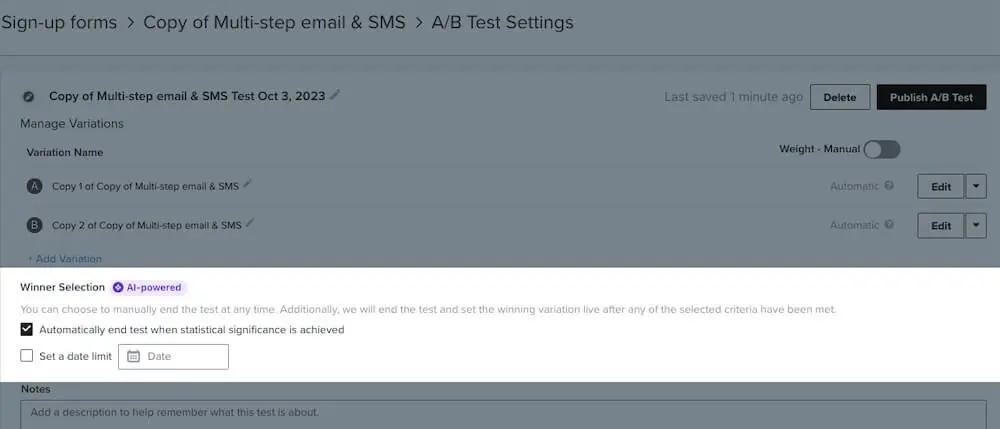
Start using AI to optimize your forms
Poorly timed pop-ups aren’t just ineffective. They can drag down your brand experience or become just plain annoying.
When you optimize your forms, you can increase your conversions, build your list faster, and get the go-ahead to market to more potential customers.
Run your first optimization test in just a few simple steps and start seeing the full potential of your sign-up forms today.


